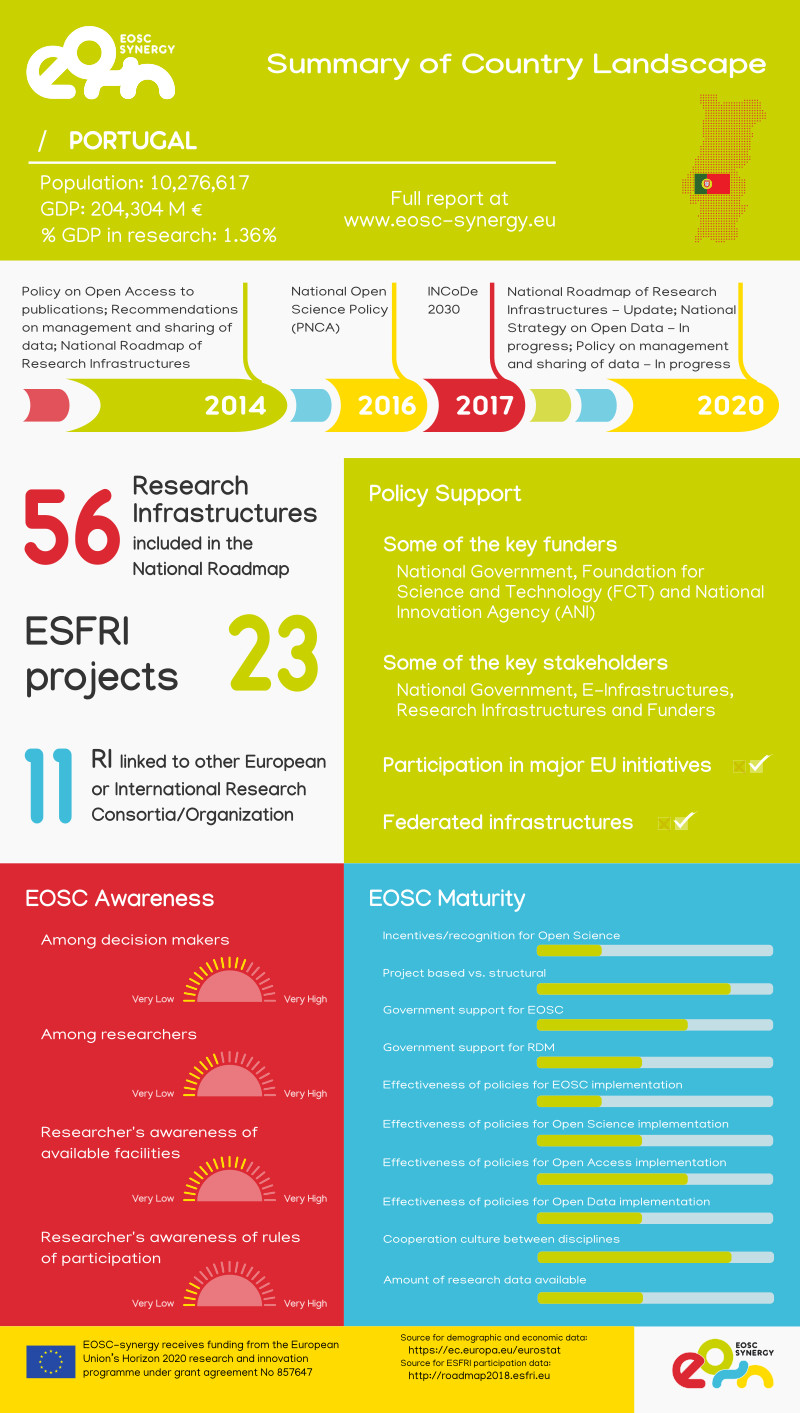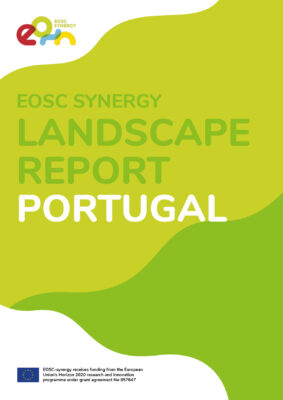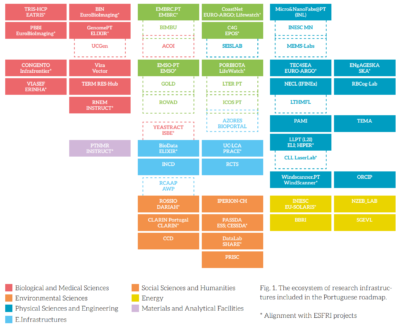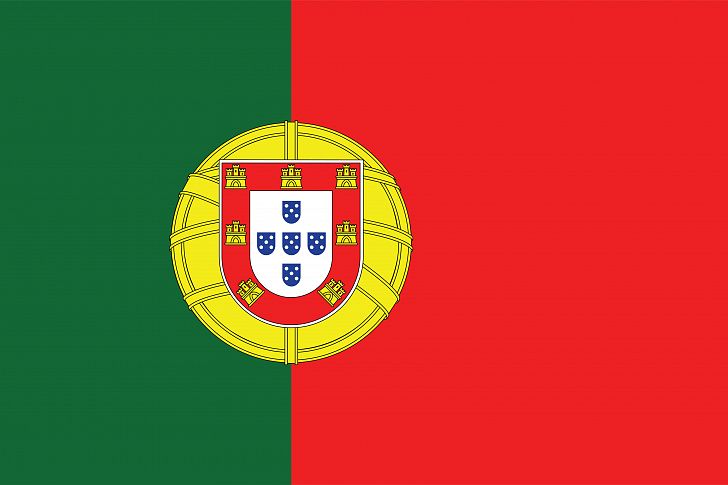

.
.
NATIONAL STRATEGY – OPEN ACCESS
The Portuguese Government and the Minister of Science, Technology and Higher Education (MCTES) have defined as a priority the commitment of science to the principles and practices of Open Science. In pursuit of this goal, the MCTES published in February 2016 the Guiding Principles for Open Science, which include:
-
Open access for the publications derived from public funding research;
-
Open access for the scientific data produced through public funding research;
-
Assurance on the preservation of scientific publications and data, enabling their reuse and continued access.
In March 2016, the MCTES was mandated by the Council of Ministers to create an Inter-Ministerial Working Group (WG) with the purpose to present a strategic plan for the implementation of the National Policy for Open Science (PNCA).
This WG includes members from the national scientific and technological system, as well as of other relevant organizations.
The Foundation for Science and Technology (FCT) is the Portuguese public agency that supports science, technology and innovation, in all scientific domains. Its mission includes the development, the funding and the evaluation of institutions, networks, infrastructures, scientific equipment, programs, projects and human resources in all the scientific and technological domains. FCT has also adopted an Open Access policy in line with the European Commission recommendations, and in accordance to other public R&D financing agencies from other countries. In fact, FCT encourages researchers to make data available from R&D projects that are publicly funded in appropriate Open Access databases, whenever possible.
Additionally, FCT recommends that researchers promote and participate in national and international projects that seek the most appropriate forms of data sharing in the different areas of knowledge.
There has been an expansion of the network of repositories of educational and research institutions, an increase in the diversity of e-services and a higher involvement of the scientific community. The project RCAAP – Scientific Open Access Repositories of Portugal is an Open Access initiative that is focused on storage, preservation and access promotion to scientific knowledge produced in Portugal. Through this platform, it is possible to access to innumerous articles from scientific journals, communications, theses and dissertations stored within several Portuguese repositories at national higher education entities and other R&D institutions.
Another important initiative is Research Data Alliance Portugal (RDA-pt), a national RDA node that links Portuguese data management communities to the RDA Working and Interest Groups. This initiative has the goal to disseminate RDA outputs and promote their adoption in Portugal, allowing the Portuguese stakeholders to benefit directly from RDA support mechanisms.
NATIONAL ROADMAP OF RESEARCH INFRASTRUCTURES
FCT supports research infrastructures of strategic interest that sustain scientific and technological advances and strengthen the capacity of the R&D community in Portugal. To this end, FCT launched in 2013 a call for the creation of the Portuguese Roadmap of Research Infrastructures of Strategic Interest (RNIE), for 2014-2020. This initiative made it possible to map and evaluate national research infrastructures and identify priority areas of national interest. This project enabled Portugal to be integrated in the group of European countries that have produced their national roadmaps, in line with the European Strategic Research Infrastructure Forum (ESFRI).
A total of forty research infrastructures were recommended for integration in the national roadmap and were distributed across seven different areas, as follows:
-
10 in Physical Sciences and Engineering;
-
9 in Biological and Medical Sciences;
-
7 in Social Sciences and Humanities;
-
5 in Environmental Sciences;
-
4 in e-Infrastructures;
-
4 in the Energy field;
-
1 in Materials and Analytical Facilities.

Figure 1 – The ecosystem of research infrastructures integrated in the Portuguese Roadmap.
In 2019, twelve new research infrastructures were added to the roadmap. These new infrastructures were integrated in the following areas:
-
5 in Physical Sciences and Engineering;
-
5 in Biological and Medical Sciences;
-
1 in Social Sciences and Humanities;
-
1 in e-Infrastructures.
The generic e-infrastructures included in the national roadmap comprise:
-
The Laboratory for Advanced Computing (UC-LCA), founded by the University of Coimbra, delivers high-performance computing (HPC) resources and services within the institution and to the national research community. UC-LCA is the national node of PRACE.
-
The National Distributed Computing Infrastructure (INCD) delivers HPC, high throughput computing (HTC), cloud computing, grid computing and data related services to the Portuguese academic and research community.
INCD bridges with the EGI Federation, the Iberian Distributed Computing Infrastructure (IBERGRID), the Worldwide LHC Computing Grid (WLCG) and the European Open Science Cloud (EOSC).
The organizations providing support to the INCD activities are the Laboratory of Instrumentation and Experimental Particle Physics (LIP), the National Laboratory for Civil Engineering (LNEC) and the National Scientific Computing Unit (FCCN), a branch of FCT.
INCD has nodes in Lisbon and Minho, and has also a collaboration with Coimbra Institute of Engineering (ISEC), whose HPC facilities are shared through INCD.
-
The Science, Technology and Society Network (RCTS) corresponds to the national research and academic network (NREN). This network is managed and operated by FCT-FCCN. RCTS has a direct alignment with GÉANT.
-
RNCA, the National Advanced Computing Network, created in 2019 provides an umbrella coordination for several infrastructures delivering advanced computing services in the country. RNCA is part of the National Forum for Digital Competences (INCoDe) in the axis 5 related to research. It aims to foster the competences and adoption of advanced computing in the country, and promote the exploitation of the advanced computing resources.
Although several of the thematic infrastructures contain a digital component within their domain of activity, the roadmap also defines one thematic e-infrastructure:
-
BioData.pt, the Portuguese Biological Data Network, offers a wide variety of services related to biological data, ranging from data curation and application integration, to support, consultancy and training services. BioData.pt includes the national node of ELIXIR.
NATIONAL ADVANCED COMPUTING STRATEGY
The National Advanced Computing Strategy is currently being detailed. The strategy is comprehensive and aims to include HPC, HTC, cloud computing and new computing paradigms. The strategy includes the support to RNCA and the national providers of advanced computing services, namely:
-
INCD, the National Distributed Computing Infrastructure, described above;
-
UC-LCA, the Laboratory for Advanced Computing, described above;
-
Engage-SKA aiming at supporting advanced computing for the national participation in the Square Kilometer Array (SKA) radio telescope;
-
MACC, the Minho Advanced Computing Centre, an HPC facility operated by the University of Minho, established in 2019.
A network of centers will provide support to advanced computing users from research, academia and industry. The network is currently being defined, and is expected to include the above mentioned RNCA providers, plus other entities with relevant expertise. The network of support centers will operate as a national distributed competence center.
The national participation in EuroHPC is an integral part of the strategy and has been strongly boosted by the approval of a PetaScale machine to be deployed at the MACC.
The international collaboration in advanced computing is another component, which includes a future Iberian Advanced Computing Network joining Portuguese and Spanish HPC centers, and the collaboration with Texas Advanced Computing Center (TACC) in the framework of the agreements UT-Austin Portugal.
Finally, the strategy also includes the development of advanced computing competences in the country.
PARTICIPATION IN INTERNATIONAL DIGITAL INFRASTRUCTURES
Portugal has a long record of participation in international digital infrastructures.
As already mentioned, FCT-FCCN operates RCTS, connected to the GÉANT backbone. In addition, FCT-FCCN coordinates the delivery at national level of GÉANT services including eduroam, eduGAIN, TCS, FileSender and cloud services.
FCT-FCCN is also collaborating with INCD, LNEC and LIP to pilot EUDAT services.
LIP operates the national node (Tier-2) in the CERN WLCG providing advanced computing services to the ATLAS and CMS experiments at the CERN Large Hadron Collider. The Portuguese Tier-2 node in WLCG supports the national participation in these large High Energy Physics experiments and fulfills the national obligations in the context of the Memorandum of Understanding for Collaboration in the Deployment and Exploitation of the WLCG. Although the initial computing model of WLCG was based on grid computing coupled with HTC, the current model is evolving towards encompassing different computing paradigms such as: HTC, cloud and HPC. The participation in WLCG enabled the development of competences that lead to the creation of the INCD infrastructure, where LIP is a key technological partner. INCD delivers a larger set of services to the wider academic and research communities.
Portugal is member of EGI.eu and participates in the EGI Federation, where LIP is the coordinator of the national node that currently integrates computing resources provided by INCD and University of Porto. The EGI services include, among others: federated cloud computing, cloud containers, HTC, distributed workload management, online storage, archive storage and data transfer.
The IBERGRID infrastructure joins Portuguese and Spanish distributed computing and data resources into a regional Iberian infrastructure, enabling a common participation in EGI, WLCG and EOSC, supporting multiple research communities including ESFRIs, High Energy Physics experiments, Astroparticle Physics experiments, life sciences communities and many others. IBERGRID is part of the Iberian bi-lateral agreements in science and technology. The national nodes of the Global Biodiversity Information Facility (GBIF) in Spain and Portugal are also being supported by IBERGRID with the GBIF data nodes being hosted at INCD in Lisbon and Institute of Physics of Cantabria (IFCA) in Santander.
The UC-LCA infrastructure operates an HPC facility and is the national node in PRACE.
There is also a national participation in several ESFRI projects that comprise strong information and communication technology (ICT) and data science.
PARTICIPATION IN GLOBAL PROJECTS RELATED TO E-INFRASTRUCTURES
In addition to the participation in digital infrastructures, there is a continuous participation in international research projects related to e-infrastructures. Some examples are as follows:
-
FCT-FCCN: GÉANT related projects such as ELLA, GN3plus, GN3, GN2, 6NET, 6DEPLOY, 6DEPLOY-2, FEDERICA, ELLA, EOSC-Synergy and EuroHPC;
-
LIP: EGI, CERN and EOSC related projects among others, such as EOSC-synergy, EOSC-hub, DEEP-Hybrid-DataCloud, INDIGO-DataCloud, EGI-ENGAGE, EGI-INSPIRE, Interactive European Grid, EELA, EGEE-III, EGEE-II, EGEE-I;
-
LNEC: EOSC-Synergy and EOSC-hub;
-
INCD: EOSC-Synergy;
-
University of Minho: FAIRsFAIR, OpenAIRE-Advance, OpenAIRE-Connect, OpenAIRE2020;
-
University of Coimbra: PRACE-6IP, PRACE-5IP, PRACE-4IP.
OTHER MEMBERSHIPS
Portugal has formal collaborations with the following international research infrastructures, organizations and networks:
-
AIR Centre – Atlantic International Research Centre;
-
CERN – European Organization for Nuclear Research;
-
CYTED – Iberian-American program for the development of science and technology;
-
ECORD – European Consortium for Ocean Research Drilling;
-
EMB – European Marine Board;
-
EMBC – European Molecular Biology Conference;
-
EMBL – European Molecular Biology Laboratory;
-
EMBO – European Molecular Biology Organization;
-
ESA – European Space Agency;
-
ESO – European Southern Observatory;
-
ESRF – European Synchrotron Radiation Facility;
-
EurOcean – European Centre for Information on Marine Science and Technology;
-
GBIF – Global Biodiversity Information Facility;
-
IAEA – International Atomic Energy Agency:
-
ICOS – Integrated Carbon Observation System;
-
IODP – International Ocean Discovery Program;
-
LifeWatch ERIC – e-infrastructure for Biodiversity and Ecosystem Research;
-
LTER – Long-Term Ecological Research Network.
EOSC PARTICIPATION
Portugal is represented in the EOSC Governance Board by a nominee from the MCTES.
The national participation in EOSC related projects include:
-
EOSC-Synergy: FCT, LIP, INCD and LNEC;
-
EOSC-hub: LIP and LNEC;
-
FAIRsFAIR: University of Minho;
-
EOSC-Life: Algarve Centre for Marine Sciences (CCMAR).
